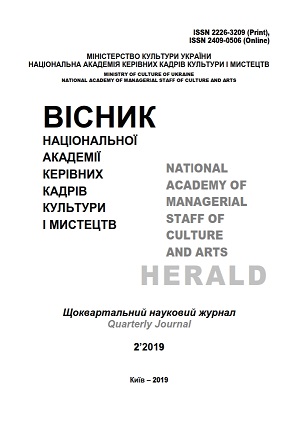«Літургійний рух» та його роль у західноєвропейській культурно-історичній та музичній традиції XIX-XX ст
“Liturgical Movement” and its Role in the Western European Cultural, Historical and Musical Tradition of the XIX-XX Centuries
Author(s): Olga Viktorivna MuravskayaSubject(s): Christian Theology and Religion, Cultural history, Music, Recent History (1900 till today), 19th Century, Eastern Orthodoxy, History of Art
Published by: Національна академія керівних кадрів культури і мистецтв
Keywords: “Liturgical movement”; “Oxford movement”; “Western Orthodoxy”; old Catholicism;
Summary/Abstract: The purpose of the article is to identify the specifics of the "Liturgical movements" of Europe in the XIX – beginning of the XX century in the processes of the rebirth of Byzantine and the prolongation of the Byzantine concept in Western European culture and music. The methodology is based on a set of methods (interdisciplinary, historical-cultural, genetic, genetic, contextual-analytical, hermeneutics, etc.) that identify East Christian (Byzantine) incentives for the development of the European spiritual and artistic tradition of the New Age. The scientific novelty of the work is determined by the fact that it was the first to substantiate the role of the Oxford, Liturgy and related movements in identifying Eastern Christian spiritual and artistic quality that nourished the culture and musical art of European romanticism and modernism. Conclusions. The review of Christian movements of the XIX-XX centuries. (“Liturgical Movement”, Old Catholicism, “Oxford Movement”, ideas of “Western Orthodoxy” by I. Overbeck, etc.) testifies to the intensity of the spiritual and Christian life in Western Europe, as well as to the significant role in the history of the Eastern Christian factor. Their natural consequence was the revival of the pre-Roman Christian rites (Gallic, Celtic, Mozarabic, etc.), which led to the scientific study of the ancient liturgical singing traditions and their specificity. This kind of renaissance of the "theurgic" quality of Christian liturgical practice led to a return to traditionalism in its high spiritual understanding, which affected the specificity of the musical creativity of representatives of this era, in which individualism of the author’s self-expression gives way to the leveling processes of this quality caused by the attraction to the reviving spiritual and musical values of "simple serious singing" and sacred "temple synthesis of the arts."
Journal: Вісник Національної академії керівних кадрів культури і мистецтв
- Issue Year: 2019
- Issue No: 2
- Page Range: 312-317
- Page Count: 6
- Language: Ukrainian

